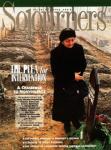I took the scroll from the angel's hand and ate it.
It was honey sweet in my mouth, but when I swallowed,
my stomach turned sour.
-- Revelation 10:10
Let's take the episode with a kind of rueful literalness, the times being evil. Conceivably, things went like this:
Myself: What, eat a scroll? But why, what's the message?
Angel: Say, for starters, Matthew chapters 5 to 8, especially that chewiest, least digestible bit of all, the one that sticks in the throat, gags, positively will not go down. The one about loving enemies.
M.: Sweet on the tongue, you said?
A.: Well, you know ourselves. Pacifists, but only between wars. Like being vegetarians, but only between meals. All that sweet talk, all those infant-formula sermons. Then all that cozening up to money and the power boys. Very little remembering, so much forgetting. No context. Now, it's said, we have guns and butter, guns melting into butter! Marines as angels of mercy! Smart bombs on providential missions!
But what about the Word, the Word? It grows weightless, a wafer on the tongue. It melts into white spit. Never reaches the gut, the heart, the bloodstream.
M.: Sour in the stomach, you say. What an image: Someone crouching in a corner, half-mad maybe, chewing away at an inky foolscap.
A.: A touch of madness in a mad time. Try it. It might drive you -- sane.
M.: Sanity maybe, catastrophe for sure. Contra naturam, that diet of yours. Belching. Vomiting even.
A.: Eat the scroll. Something might happen. Imagine it. The Word gets inside you, down and down. An emetic. Maybe that's the meaning here: You rid yourself of a slow-working, permeating poison. Call it moral paralysis, inhibition, dead images. Who knows, maybe you'll see something for the first time: The formidable resourcefulness of dark minds, the sweet talk of the powers, the latest hard sell of a lukewarm war!
How right Socrates was: Old sophists never die, they just go on "making the worse the better argument." You've heard it all: "kingdom of darkness," "some people beyond redemption." Or, "first guns, then butter." Or worse and worse: "Those rapist ethnic cleansers! Now you've got to admit, this time, beyond the shadow of a sane doubt, we've got the absolutely virtuous, necessary, salvific, compassionate, surgical project, just waiting for our get-up-and-go, our grit."
M.: My aching gut!
A.: Remember the old song? "Everybody wants to go to heaven, nobody wants to die ..." Remember, remember. A peace camp in the Iraqi desert. Witness for Peace in Central America. South Africans facing the guns and dogs. Buddhists impeding the tanks in Hue. Selma, Dr. King, the country shaking off a long sleep.
Now let's remember something else -- the future. There must be at least 10,000 young people around the world who've refused military induction/seduction. They've already swallowed the scroll! Now suppose they heard a story, how St. Francis trekked across the world, seeking a meeting with the Sultan.
Suppose these resisters of ours came unarmed to the border of a war zone, fasted there, prayed, marched right in. In sum, risked their lives, with one thing in mind: to bring sanity, an alternative, to a mad impasse. Suppose they hung in, refused to go away, eventually sat down with those bristling, untrusting leaders.
M.: Wait a minute. Suppose they failed. Suppose they were gunned down.
A.: (Breaks into song.) "Everybody wants to go to heaven, nobody wants to die."
Daniel Berrigan, S.J., was a poet, peace activist, and a Sojourners contributing editor when this article appeared.

Got something to say about what you're reading? We value your feedback!
